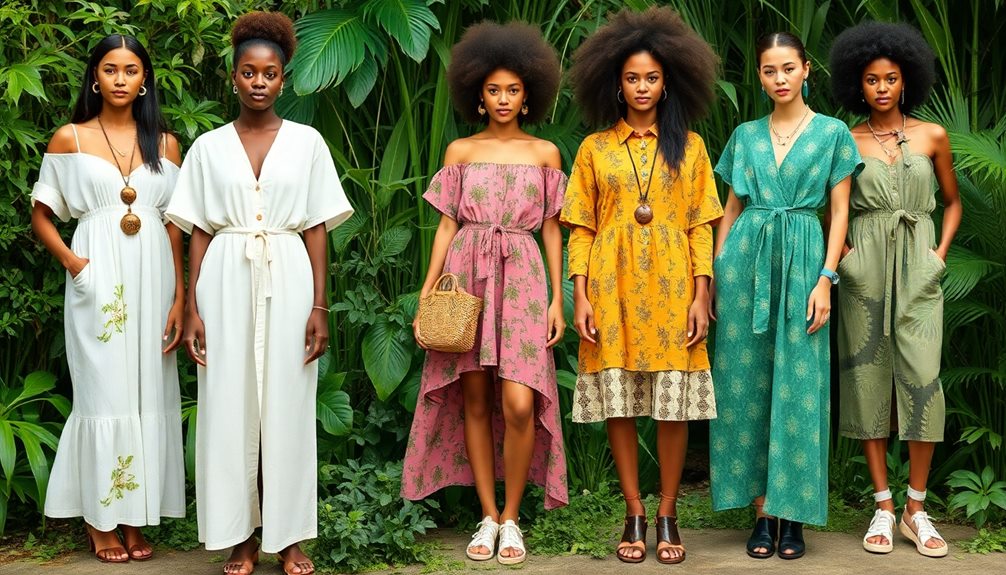Understanding sustainable fabric certifications like GOTS and Oeko-Tex is essential for making informed choices about your textiles. GOTS guarantees at least 70% organic fibers and promotes ethical manufacturing, including fair labor practices. Oeko-Tex focuses on safety by testing for over 350 harmful chemicals, confirming you that the fabrics you use are safe for both you and the environment. These certifications not only enhance product transparency but also support eco-friendly practices. By choosing certified fabrics, you align your purchases with your values. There's a lot more to uncover about these certifications and their benefits for your lifestyle.
Key Takeaways
- GOTS certification ensures at least 70% of fibers are organic, promoting sustainability and ethical manufacturing practices in textiles.
- Oeko-Tex certification evaluates over 350 harmful substances, ensuring textiles are safe for consumers and free from toxic chemicals.
- Both certifications enhance product transparency, building consumer trust and supporting Sustainable Development Goals (SDGs) in the textile industry.
- Certified fabrics prioritize health and safety through rigorous testing, compliance with REACh regulations, and adherence to fire safety standards.
- Brands like Coyuchi and Matouk exemplify commitment to sustainability, offering certified products that reflect eco-friendly values and ethical sourcing.
Importance of Fabric Certifications
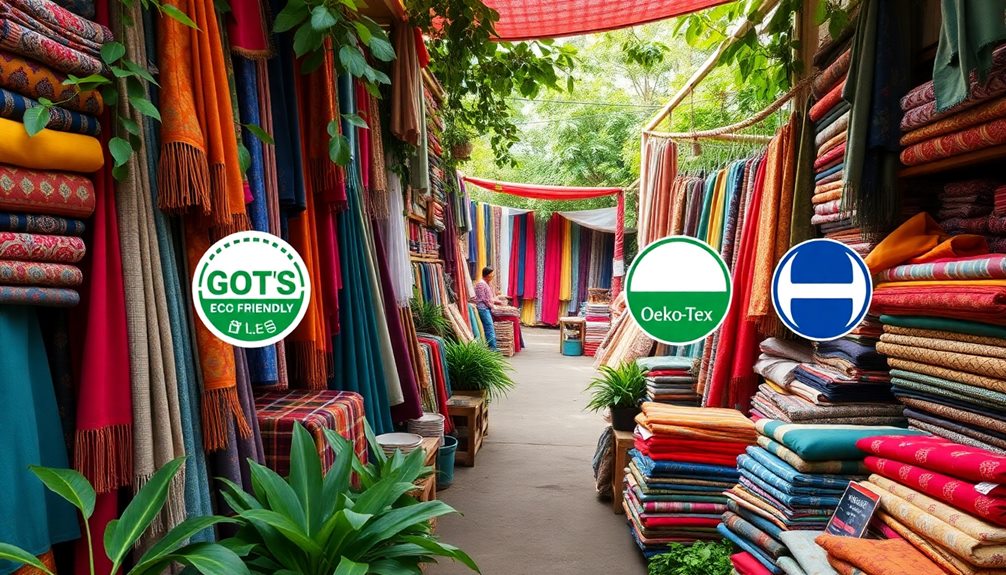
Fabric certifications play a crucial role in promoting transparency and trust in the textile industry. When you see certifications like GOTS (Global Organic Textile Standard) and Oeko-Tex on a product, you can feel confident that it meets high standards for quality and safety.
GOTS requires at least 70% certified organic fibers, ensuring that the fabric isn't only environmentally friendly but also ethically produced. It incorporates strict environmental criteria and social responsibility measures throughout the supply chain.
On the other hand, Oeko-Tex, particularly its Standard 100, tests for over 350 harmful substances in textiles. This means that every component, from threads to buttons, is checked for safety, giving you peace of mind when you buy clothing or home textiles.
These certifications enhance the marketability of products while supporting the Sustainable Development Goals (SDGs) by promoting responsible practices.
Overview of Oeko-Tex Certification
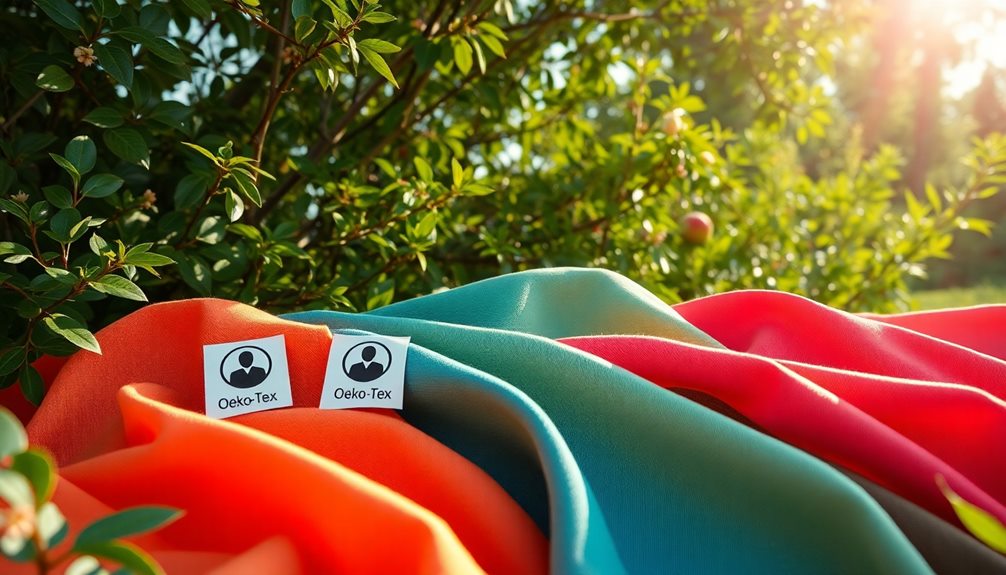
Guaranteeing safety and quality in textiles, Oeko-Tex Certification has become a benchmark for consumers seeking reassurance about the products they buy. Established in 1992, the Oeko-Tex Standard 100 Certification guarantees that textiles are tested for harmful substances, covering everything from fabrics to buttons. It evaluates over 350 toxic chemicals, making it stricter than many safety standards.
Here's a quick overview of the key aspects:
| Feature | Description |
|---|---|
| Certification Standard | Oeko-Tex Standard 100 Certification |
| Tested Components | Fabrics, threads, buttons, zippers |
| Number of Chemicals Evaluated | Over 350 toxic chemicals |
| Global Recognition | Yes, recognized worldwide |
| Verification Tool | Oeko-Tex Label Check tool for transparency in textile safety |
Products certified under Oeko-Tex Standard 100 are guaranteed to be free from harmful substances, promoting consumer health and safety. The certification process involves 17 independent research and testing institutes in Europe and Japan, guaranteeing reliability. With this certification, you can shop with confidence, knowing your textiles support a safer environment.
Understanding GOTS Certification
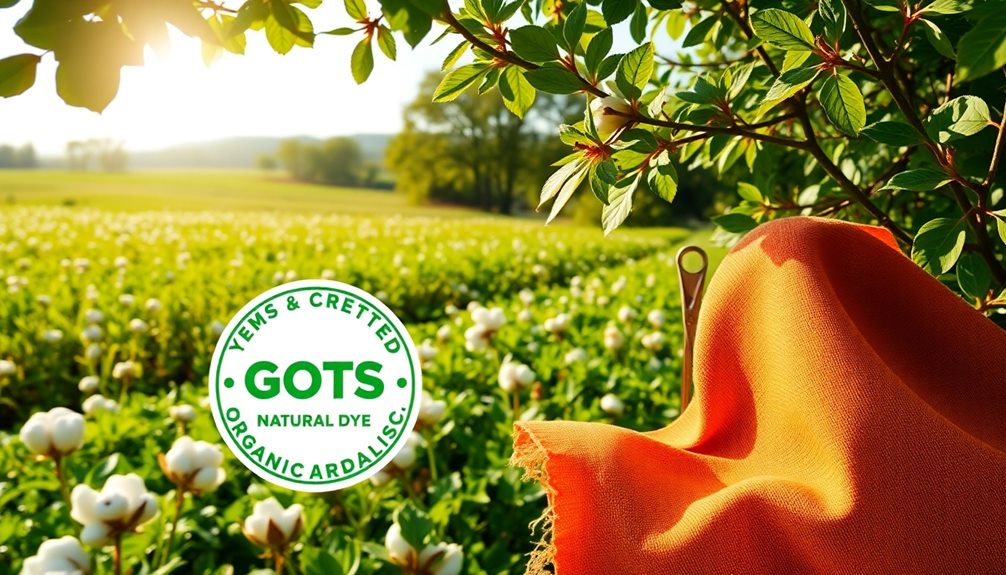
When it comes to sustainable textiles, GOTS Certification stands out as a critical standard for guaranteeing organic integrity. This certification guarantees that at least 70% of the fibers in your products are certified organic, with labels that say "organic" needing a minimum of 95% certified content.
The certification process is managed by independent third-party organizations, which guarantees transparency in textile production.
Key aspects of GOTS Certification include:
- Strict regulations on harmful substances, including dyes and chemical inputs
- Mandatory wastewater management plans for wet processing to minimize pollution
- Social criteria that promote fair labor practices and decent working conditions
- An emphasis on responsible resource usage to protect the environment
Health and Safety Standards
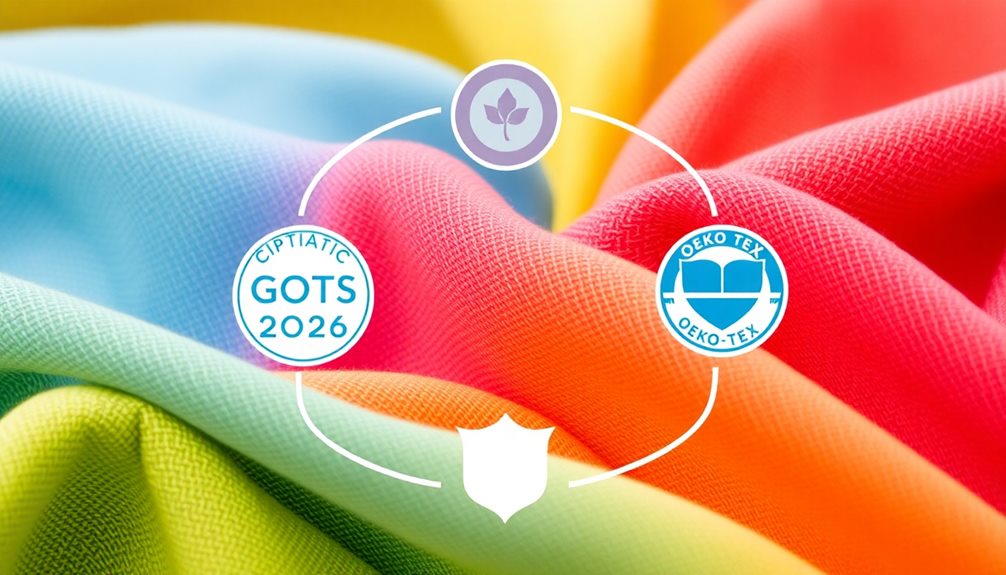
When considering health and safety standards in textiles, you need to pay attention to chemical safety testing and fire safety regulations.
Certifications like Oeko-Tex and GOTS guarantee that the fabrics you choose are free from harmful chemicals and meet strict fire safety guidelines.
This way, you can feel confident that your fabric choices prioritize your well-being and safety.
Chemical Safety Testing
Chemical safety testing is essential for guaranteeing that textiles are safe for consumers, especially when it comes to children's products. Oeko-Tex certification plays a vital role in this process by testing for over 350 harmful substances. This rigorous testing and certification system verifies that fabrics are free from toxins, promoting health and safety standards.
Here are some key aspects of chemical safety testing:
- Independent Laboratory Testing: Every production stage, from raw materials to finished products, undergoes thorough examination.
- EN71-3 Certification: This specific certification guarantees fabrics meet European safety standards, particularly for children's items.
- Absence of Carcinogens: Oeko-Tex certification assures textiles are free from carcinogenic colorants and allergens.
- Compliance with REACh: The certification aligns with European Chemicals Regulation, addressing harmful chemicals that mightn't yet be legally restricted.
Fire Safety Regulations
Fire safety regulations are essential for guaranteeing textiles meet stringent safety standards, protecting both consumers and property from potential hazards. When you choose textiles, look for certified materials that comply with regulations like BS5867 Part 2 Type B and C, which help reduce fire risks through specific flammability tests.
For high-risk environments, certifications like Crib 5 and Crib 7 guarantee fabrics used in hospitals or prisons meet even stricter fire safety standards. The manufacturing process of these textiles may involve flame retardant treatments, enhancing their ability to resist ignition and reducing the likelihood of fire-related incidents.
Tests such as the Smouldering Cigarette Test, Match Test, and Crib 5 Test evaluate materials' resistance to specific ignition sources, guaranteeing they're safe for use. When comparing options, consider GOTS vs. STANDARD 100 by Oeko-Tex certifications.
While GOTS focuses on organic and sustainable practices, STANDARD 100 guarantees textiles are free from harmful substances, including those affecting fire safety. By understanding these regulations and certifications, you can make informed choices that prioritize both sustainability and safety.
Sustainability and Ethical Sourcing
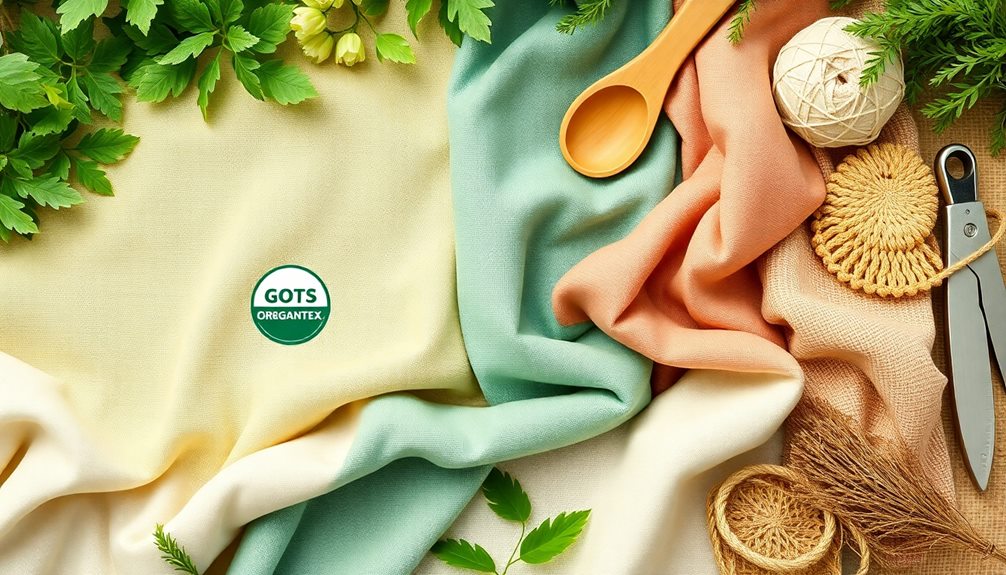
Emphasizing sustainability and ethical sourcing is essential for a responsible textile industry. By choosing fabrics that are GOTS or Oeko-Tex Certified, you support eco-friendly practices and promote fair labor conditions. These certifications guarantee that the textiles you use meet rigorous standards, giving you peace of mind about their impact.
Here are some key aspects of sustainable and ethical sourcing:
- GOTS certification guarantees that at least 70% of the fibers are organic, promoting sustainable textile production.
- Oeko-Tex Certified fabrics are tested for over 100 harmful chemicals, protecting both consumer health and the environment.
- Compliance with REACH regulations minimizes hazardous substances in textiles, guaranteeing ethical labor conditions throughout the supply chain.
- Certification standards facilitate transparency, allowing you to make informed choices that align with your values.
When you prioritize these certifications, you're not just selecting a product; you're supporting a movement towards better practices in the textile industry.
Embrace sustainable textiles, and contribute to a healthier planet and a fairer world for workers.
Recognized Brands With Certifications
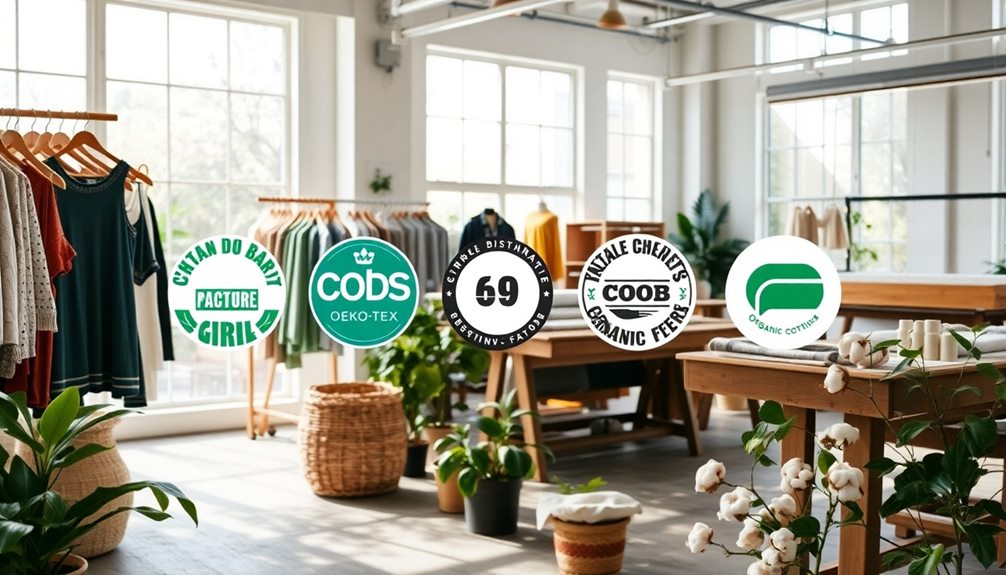
When you're exploring sustainable fabrics, it's important to look for brands that carry trusted certifications. These certifications, such as GOTS (Global Organic Textile Standard) or Fair Trade, ensure that the fabrics are produced ethically and with minimal environmental impact. Understanding why sustainable fashion is better involves recognizing its benefits, like reducing waste, conserving resources, and supporting fair labor practices. By choosing eco-friendly materials, you not only promote a healthier planet but also contribute to a fairer and more equitable fashion industry.
Brands like Coyuchi, with its GOTS certification, and Matouk, recognized for OEKO-TEX standards, lead the way in ethical sourcing and environmental responsibility.
These certifications not only guarantee quality but also align with your commitment to sustainability.
Notable GOTS Certified Brands
Many brands are stepping up to meet the growing demand for sustainable textiles, and GOTS certification is a hallmark of their commitment to environmental and social responsibility. One standout brand is Coyuchi, which exclusively uses 100% organic fibers in all its bedding and home decor products.
These certified textiles not only guarantee minimal harm to humans and the environment but also support ethical sourcing practices. Additionally, many consumers are increasingly seeking products that reflect their values, such as those that use natural sweetening alternatives to refined sugars.
Here are some notable features of GOTS-certified brands like Coyuchi:
- Offers a variety of products, including towels, quilts, and sheets.
- Maintains a high level of organic content, often exceeding the 70% requirement.
- Adheres to strict social criteria, promoting fair labor practices.
- Supports workers' rights throughout the supply chain.
Leading Oeko-Tex Brands
As consumers become more aware of the impact of textiles on health and the environment, brands with OEKO-TEX certifications are gaining recognition for their commitment to safety and sustainability.
These certifications guarantee that textile products are free from harmful substances, aligning with sustainable practices that prioritize both your health and the planet.
Matouk stands out with a range of OEKO-TEX certified fabrics, showcasing its dedication to safe and eco-friendly textiles.
Similarly, Yves Delorme's OEKO-TEX certified sheets and towels meet strict safety standards, giving you peace of mind in your home.
Mode Living offers OEKO-TEX certified home textiles, guaranteeing that your living spaces are filled with safe and environmentally-friendly options.
If you're looking for stylish bedding that doesn't compromise safety, Designers Guild provides OEKO-TEX certified options that combine aesthetics with health standards.
Fig Linens and Home is also committed to stocking a majority of OEKO-TEX certified linens, demonstrating their prioritization of consumer health and environmental protection.
Benefits of Certified Fabrics
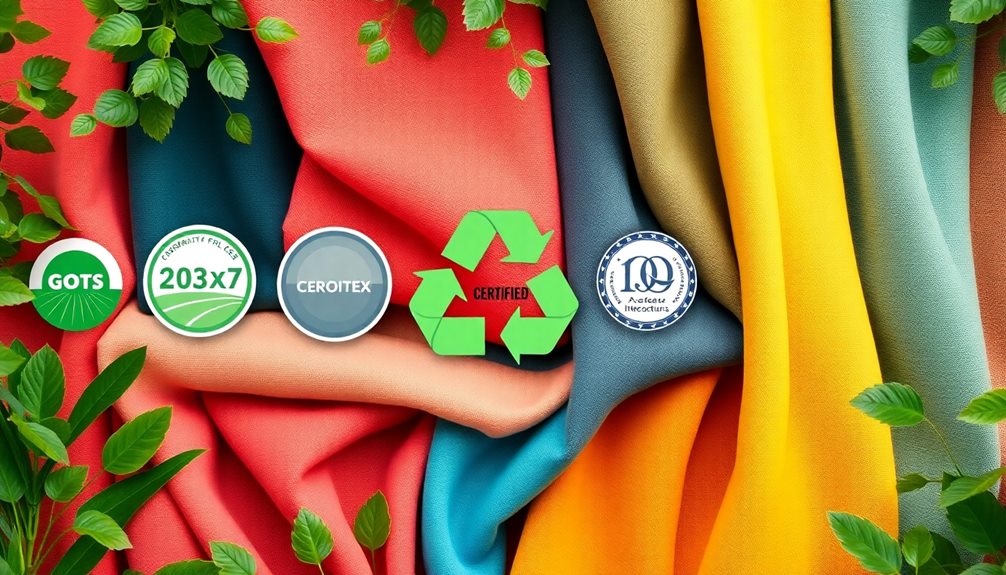
Certified fabrics offer a wealth of benefits that enhance both consumer safety and environmental sustainability.
When you choose fabrics certified by GOTS or Oeko-Tex, you're making a conscious decision for your health and the planet.
Here are some key advantages of certified fabrics:
- Health and Safety: They're rigorously tested for over 100 toxic chemicals and allergens, ensuring a safer choice for you and your family.
- Organic Fibers: GOTS certification guarantees that at least 70% of the fabric is made from certified organic fibers, promoting sustainable farming practices.
- Ethical Manufacturing: Certified fabrics comply with ethical manufacturing standards, ensuring fair labor conditions and social responsibility throughout the supply chain.
- Eco-Friendly Practices: Investing in these textiles supports sustainable practices and aligns your purchases with broader environmental goals.
Frequently Asked Questions
What Is the Difference Between GOTS and OEKO-TEX?
GOTS and OEKO-TEX differ in focus; GOTS emphasizes organic fibers and sustainable practices, while OEKO-TEX prioritizes safety from harmful substances. You'll find GOTS has stricter environmental and labor criteria compared to OEKO-TEX's safety standards.
What Is OEKO-TEX Certified Fabric?
OEKO-TEX certified fabric means it's tested for over 350 harmful substances, ensuring safety for you and your skin. It covers every component, providing peace of mind when choosing textiles for your wardrobe or home.
What Does 100% GOTS Mean?
Picture soft, organic cotton caressing your skin; when you see "100% GOTS," it means that fabric's made from at least 95% certified organic fibers, meeting rigorous environmental and social standards throughout its production journey.
What Does It Mean to Be GOTS Certified?
Being GOTS certified means your textile products meet strict organic standards. They contain at least 70% organic fibers, use eco-friendly dyes, and guarantee fair labor practices throughout the supply chain, promoting sustainability and consumer trust.
Conclusion
When you choose certified fabrics, you're not just opting for quality; you're embracing a healthier planet and a safer future. GOTS and Oeko-Tex certifications stand as beacons of trust amidst a sea of options. While some fabrics may promise comfort, certified choices guarantee it alongside sustainability. So, as you wrap yourself in that cozy garment, remember—it's not just about style; it's about making a positive impact on the world, one stitch at a time.



